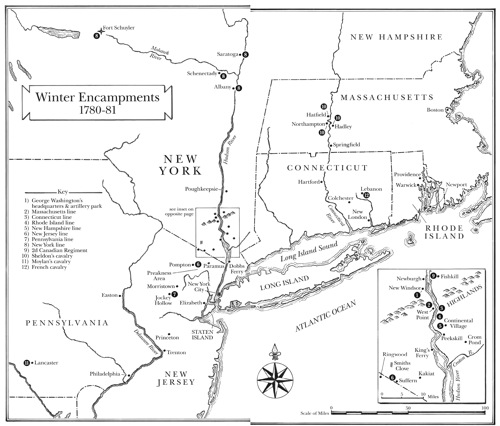Major General William Heath to George Washington, 25 March 1781
From Major General William Heath
West point, March 25th 1781
Dear General,
I have been making enquiry where and with what convenience such of the troops as have not had the small pox, can be inoculated—I find that about 240 can be accommodated to take it at once at the New Hampshire huts, but the number who have not had it, is greater.1 If your Excellency thinks it most advisable, under our present situation, for a part only to have it at a time, the New Hampshire huts are sufficient; but if best for all to take it at once, it cannot be well effected, unless it be admitted at the Connecticut huts2—This I submit for your Excellency’s determination—as soon as I am honored with it, no time shall be lost. If the measure is adopted, I request that the Director-general may be immediately instructed to furnish such stores as are necessary, and arrange and direct what Surgeons, &c. are to attend—A quantity of indian meal will be wanted3—In our present embarrassed state, trifling as that article may appear, perhaps some special order on the Agent, Commissary, or Quartermaster-general’s departments may be necessary.4 I have the honor to be With the greatest respect, Your Excellency’s Most obedient servant
W. Heath
LS, DLC:GW; ADfS, MHi: Heath Papers.
1. Heath had written Col. Alexander Scammell from West Point on 22 March: “I have determined with the Consent of the Commander in Chief to Inoculate Such of the Troops as have not had the Small pox.” Because Scammell’s camp was “the most eligible place for the purpose of Inoculation,” Heath asked “how many patients in addition to those of your own Line can take it at your Hutts” (MHi: Heath Papers). For recent smallpox outbreaks, see Heath’s first letter to GW, 1 Feb., and GW to Heath, 2 Feb.; see also Heath to GW, 28 Feb., postscript.
In his reply to Heath on 24 March, Scammell reported that “we can by crowding our men, spare twenty hutts for the admission of innoculated soldiers which will contain ten or twelve men each—Some of the Hutts are out of repair, by being left empty. I shall order out the men to repair them Tomorrow and to complete some which were left unfinish’d. I am apprehensive that the Room will not be sufficient for the Number of Patients to be admitted, which I presume will exceed 240.” He added that this number was the “most that our Hutts can receive, with convenience and comfort to the Patients at this season of the Year, in a hollow situation like ours, where we by no means have a free circulation of Air” (MHi: Heath Papers). Scammell revised his estimate in the postscript of his letter to Heath written from “New Hampshire Village” on 28 March: “By crowding our men very close our Hutts may possibly contain 300 men exclusive of our own men who are to be innoculated—And the others who must necessarily remain in the Huts” (MHi: Heath Papers). Scammell then concluded a letter to Heath from the same location on 1 April: “The surgeons are apprehensive that the men are stowed too close—sixteen are sent into a Hutt sixteen by fourteen feet in the clear—Tho’ I shall pay particular Attention that the men are kept in the open Air as much as their circumstances will permit” (MHi: Heath Papers; see also Heath’s first letter to GW, 26 March, n.2).
Sgt. Ebenezer Parkman, Jr., who served with the artificers then at Fishkill, N.Y., was among the soldiers who underwent inoculation. He wrote in his diary entry for 16 March: “I Began to Diet for the Small Pox—To refrain from Meat very Bad for me, & Others, having No Stores to live on.” Parkman then wrote in his diary entries for 23 and 25 (Sunday) March: “Genl Heath Does not Consent for the Artificers to have the Small pox. … I was Inoculated for the Small Pox, Sabbath Morning At Fish Kill Barracks, It being his Excellencys Orders.” Parkman added in his entry for 26 March: “May God be very Gracious to me, and Carry me Safe through the Opperation, to His praise, & Glory; Or prepare Me for His holy, & Sovereign Will!” In his entry for 29 March, Parkman wrote: “I was Inoculated the 3d time for the Small Pox, Which Took. Several Others were Inoculated again, The first not taking.” Parkman then wrote in his entries for Saturday-Monday, 7–9 April: “This afternoon I was Seiz’d with the Symtoms of the Small Pox—Violent headake & Cold Chills—Reman’d a Sabh Day So A few Pox were Visible in my Face Monday Morning—I movd into the Room among the Others.” Parkman then wrote in his entries for 13 and 19 April: “The Small Pox Exceeding favourable to all of Us, praised be Gods holy Name … It highly becomes Each of Us—who have experiencd the Wonderful Mercies of God in Carrying Us thrõ the Small Pox with Safety—For ever to praise His holy Name” (all entries from Parkman’s diary in MWA: Parkman Family Papers).
2. All of these huts were across the Hudson River near West Point (see GW to Samuel Huntington, 28 Nov. 1780, and n.5).
3. Nathaniel Stevens, deputy commissary general of issues at Fishkill, N.Y., reported “no Indian meal” when he wrote Heath on this date (MHi: Heath Papers; see also Heath to GW, 11 April, n.3).
4. GW replied to Heath on 26 March.

Map 4. Smallpox inoculations occurred at the New Hampshire winter encampment east of the Hudson River. Having dissolved after a mutiny in early January, the Pennsylvania line no longer occupied the encampment at Jockey Hollow. (Illustrated by Rick Britton. Copyright Rick Britton 2022)

![University of Virginia Press [link will open in a new window] University of Virginia Press](/lib/media/rotunda-white-on-blue.png)
